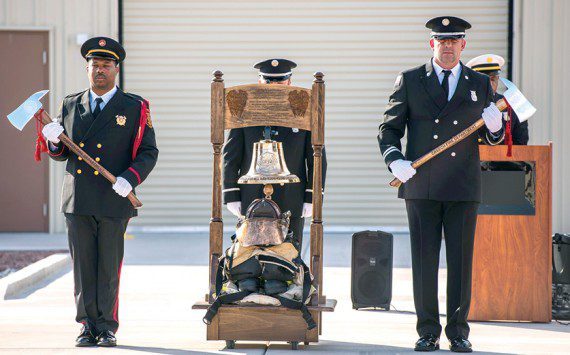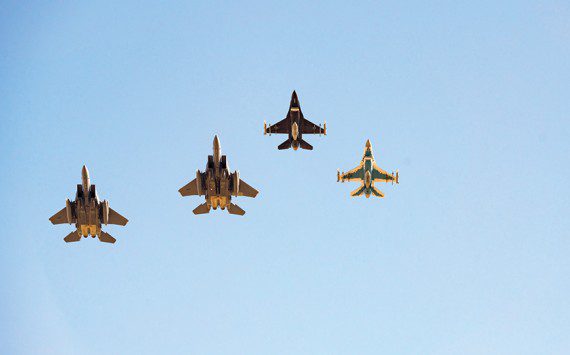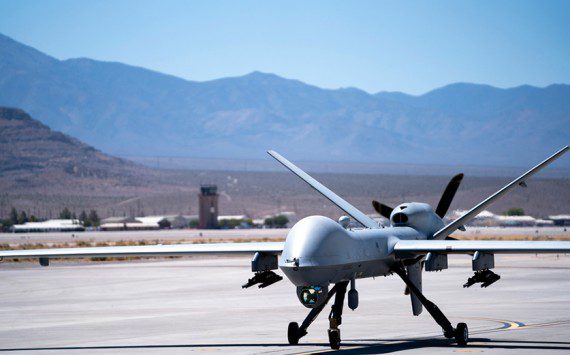NELLIS AIR FORCE BASE, Nev. — The most dynamic learning at the U.S. Air Force Weapons School often takes place outside the classroom when students participate in real-world events.
The 26th Weapons Squadron’s cadre and students seized that opportunity in September, expanding upon already-programmed curriculum events in Europe to also participate in remotely piloted aircraft tactical planning with the 603rd Air and Space Operations Center and collaborate with NATO in an RPA tactics exchange — the first exchange of its kind for all parties involved.
The 26th WPS’ European trip began with a visit to the 603rd AOC at Ramstein Air Base, Germany.
The 603rd AOC executes command and control of air, information and space operations throughout 32 million square miles of air space in the U.S. European Command and U.S. Africa Command. RPAs have an important role in the 603rd AOC mission, reflecting a longstanding RPA legacy in Europe that stretches back to the Balkan Wars.
During the visit, Lt. Col. Bryan Callahan, 26th WPS commander, briefed the current state of RPA operations. He also projected future RPA employment within the full range of military operations.
The 26th WPS students participated in an AOC planning exercise to integrate the MQ-1B Predator and MQ-9 Reaper into USAFE operations. The students saw firsthand how the different elements of an AOC work together.
Using a current 603rd AOC operations plan, they analyzed the current state of USAFE operations and areas in which RPAs could provide the best effects. The planning exercise culminated with the students briefing the Combat Plans and Strategy Divisions on their proposed action plans.
Capitalizing on the 26th WPS’ presence in Europe, USAFE invited the cadre and students to be part of the first-ever NATO RPA tactics exchange workshop, hosted by Headquarters USAFE-AFAFRICA. Col. Harry Benham, chief of the Operations and Plans Division at USAFE-AFAFRICA, kicked off the workshop by noting closer collaboration among allies is key to successful coalition operations.
During the NATO event, the 26th WPS met with NATO partners France, Netherlands, Italy and the United Kingdom to discuss the current state of RPA operations. Each country provided insight on the current tactical problems it faces. The 26th WPS described how it tackled different mission sets, integration methods with other platforms, and limitations.
Focusing on U.S. partnerships with NATO allies, Callahan emphasized how vital these relationships are to the defense of Europe and NATO interests. An essential piece of that collaboration is the need for shared information on the tactics, techniques and procedures most effective for employing RPAs in contested and near-peer environments. Working together is critical to strengthening NATO’s ability to respond to reenergized threats.
While the 26th WPS is leading the U.S. Air Force into RPA employment in contested environments, it values input from the NATO partners.
“We made it clear that we didn’t have all the answers and were eager to learn from their experiences,” Callahan said. “We are particularly interested in how they man their missions and RPAs with all-officer crews, preferably personnel with significant tactical and aviation experience.”
The 26th WPS students and cadre then briefed U.S. tactics for a number of mission sets. This collaboration between the 26th WPS and NATO partners established an avenue through which all parties can exchange RPA lessons learned in the future.
The participating NATO nations endorsed the value of the workshop and unanimously recommended it become an annual event.
The 26th WPS ended its European visit with a tour of the Distributed Ground System-4, which is part of the U.S. Air Force Distributed Common Ground System. DGS-4 collects, processes, exploits and disseminates intelligence data derived from platforms like the MQ-1.
DGS-4 personnel demonstrated how it integrates into current RPA combat operations. The 26th WPS students had a rare opportunity to view combat operations and ask questions about the DGS capabilities.
The 26 WPS European trip enriched the students’ USAFWS experience and generated ideas to better serve combatant commanders.
More importantly, events like the NATO exchange strengthen ties with NATO partners and open communication lines about specific challenges and lessons learned relevant to effective RPA operations.
Quicklinks

Published every other Friday, Nellis AFB Desert Lightning News is distributed on Nellis AFB, as well as locations throughout Las Vegas, NV
News and ad copy deadline is later than Monday, 4:30 p.m., the week of desired publication date. The publisher assumes no responsibility for error in ads other than space used.










